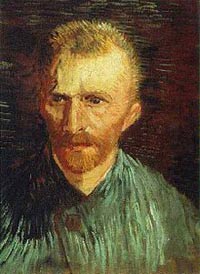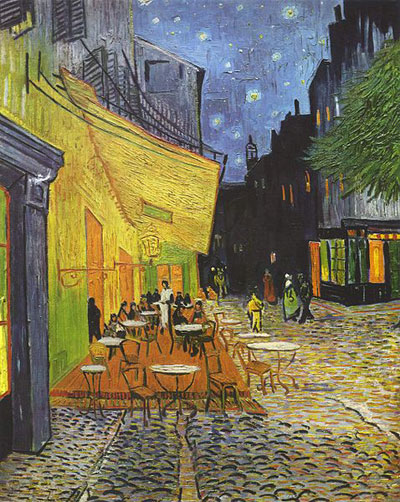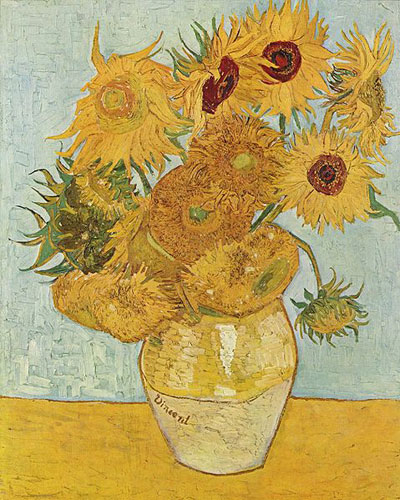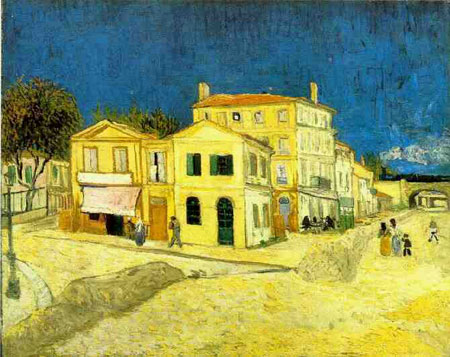What am I in the eyes of most people — a nonentity, an eccentric, or an unpleasant person — somebody who has no position in society and will never have; in short, the lowest of the low. All right, then — even if that were absolutely true, then I should one day like to show by my work what such an eccentric, such a nobody, has in his heart. That is my ambition, based less on resentment than on love in spite of everything, based more on a feeling of serenity than on passion.
– Vincent Van Gogh (letter to Theo, July 1882)
Vincent Van Gogh 1853-1890. Vincent Van Gogh was an artist of exceptional talent. Influenced by impressionist painters of the period, he developed this with his own instinctive, spontaneous style. Van Gogh became one of the most celebrated artists of the twentieth century and played a key role in the development of modern art.
Short Biography Vincent Van Gogh
He was born in Groot-Zundert, a small town in Holland in March 1853. His father was a Protestant pastor and he had three uncles who were art dealers.
 His early life seems generally to be unhappy, after a period of working in his uncle’s art dealers, he became frustrated and so became a Protestant minister. He became a preacher in the poor agricultural districts of Brabant. He empathised with the poverty of the inhabitants and began to share their poverty and rough living conditions. Despite trying to live according to the gospel message of poverty, the church authorities were displeased that Van Gogh seemed to be undermining the ‘dignity of the priesthood.’ He was relieved of his post and Van Gogh turned to art. Despite always disliking any formal training, he studied art in both Brussels and Paris. He began painting seriously, and in Paris was influenced by the new impressionist painters of Monet, Renoir and others. Financially helped by his close brother Theo, Van Gogh later travelled to Arles in the south of France were he continued his painting – often outside – another feature of the impressionist movement.
His early life seems generally to be unhappy, after a period of working in his uncle’s art dealers, he became frustrated and so became a Protestant minister. He became a preacher in the poor agricultural districts of Brabant. He empathised with the poverty of the inhabitants and began to share their poverty and rough living conditions. Despite trying to live according to the gospel message of poverty, the church authorities were displeased that Van Gogh seemed to be undermining the ‘dignity of the priesthood.’ He was relieved of his post and Van Gogh turned to art. Despite always disliking any formal training, he studied art in both Brussels and Paris. He began painting seriously, and in Paris was influenced by the new impressionist painters of Monet, Renoir and others. Financially helped by his close brother Theo, Van Gogh later travelled to Arles in the south of France were he continued his painting – often outside – another feature of the impressionist movement.
Cafe Terrace at Night 1888 ( Kröller-Müller Museum)
When I have a terrible need of — shall I say the word — religion. Then I go out and paint the stars.
– Vincent Van Gogh
In Arles, he had a brief, if unsuccessful, period of time with the artist Gauguin. Van Gogh’s intensity and mental imbalance made him difficult to live with. At the end of the two weeks, Van Gogh approached Gauguin with a razor blade. Gauguin fled back to Paris, and Van Gogh later cut off the lower part of his ear with the blade.
This action was symptomatic of his increasing mental imbalance. He was later committed to a lunatic asylum where he would spend time on and off until his death in 1890. At the best of times, Van Gogh had an emotional intensity that flipped between madness and genius. He himself wrote:
“Sometimes moods of indescribable anguish, sometimes moments when the veil of time and fatality of circumstances seemed to be torn apart for an instant.”
– Vincent Van Gogh

Vase with 12 sunflowers – 1888
It was during these last two years of his life, that Van Gogh was at his most productive as a painter. He developed a style of painting that was quick and rapid – leaving no time for contemplation and thought. He painted with quick movements of the brush and drew increasingly avant garde styles shapes – foreshadowing modern art and its abstract style. He felt an overwhelming need and desire to paint.
The work is an absolute necessity for me. I can’t put it off, I don’t care for anything but the work; that is to say, the pleasure in something else ceases at once and I become melancholy when I can’t go on with my work. Then I feel like a weaver who sees that his threads are tangled, and the pattern he had on the loom is gone to hell, and all his thought and exertion is lost.
– Vincent Van Gogh
In 1890, a series of bad news affected his mental equilibrium and one day in July, whilst painting, he shot himself in the chest. He died two days later from his wound.

EmoticonEmoticon